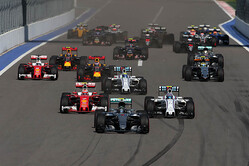


07/08/2016
NEWS STORY
 Whilst fans are currently watching how the 2016 season plays out, most teams have already switched their focus to 2017 when a raft of new regulations aimed at making F1 faster and sexier come into play.
Whilst fans are currently watching how the 2016 season plays out, most teams have already switched their focus to 2017 when a raft of new regulations aimed at making F1 faster and sexier come into play.
Even as most of the paddock headed off on holiday after Germany, Pirelli, in association with Ferrari and Red Bull was testing its much-anticipated wider 2017 tyres.
With attention divided between the old and the new, some might have forgotten that the current engine formula only runs to the end of 2020, and a number of leading technical directors admit that now might be the time to start looking ahead.
"I think it is about time we started to talk about the engine beyond this one or power unit, really, we should say," said Paddy Lowe.
"It does raise some very big considerations, such as how do we define an engine or power unit that is correct for the sport but also relevant to the kind of power units that we will see in the future in road cars?
"Do we remain in some way related to that technology which is increasingly electrical or do we go our own way? There are some very, very important questions there.
"The debate started really with the issue of the sound of these engines when they arrived in 2014. It's better now than it was back then but it doesn't match the sound of the old V8s or the V10s but it still raises an interesting debate.
"I think road cars of the future, at some point not that far off, will be completely silent if they are all electrical so will we want noise, will we associate noise with performance or not? There are some very interesting debates there and I think we need to start that process."
"I think what we have learned from this cycle and this era of hybrid engines is that the power units now are very, very complicated and it needs a lot of planning," added Ferrari's Jock Clear, "and I think we'll go into those next negotiations with eyes wide open this time, which may be that time round, for a lot of us, and I don't think there's anybody who didn't fall into the category of underestimating what might have been involved, and as such, the sooner we start, the sooner we'll be aware and the sooner we can come to a solution that will be the best for the sport.
"So yeah, we do need to think about these things, we need to think about it in the context of what the sport needs, what the public wants, what looks sexy. But fundamentally, it's still a technological challenge and we need to get the technology right."
"We should probably start sooner rather than later," agreed Red Bull's Paul Monaghan, "and I think Formula One should look at itself and decide what level of power unit performance differentiation does it seek. Should it be a dominant between the teams, should it be a factor within your performance differentiation and then look at how long has it taken these power units to begin to converge - we haven't converged as yet - and how does that look into the next few years of those next engine rules?
"If we can establish those perhaps more successfully than we did for the 2014 engine, and maybe different views around my colleagues, then I think the formula could be healthier and then the other debates - how much noise do we have and what spectacle does Formula One wish to create - should become part of that debate? And then it begins to set a cost level and a technology level that the sport thinks is acceptable and how you proceed from there."
"It's got to be affordable hasn't it?" said Pat Fry. "The costs have snowballed since the normally aspirated engines. It does need bringing back under control to some degree, doesn't it?"
"We probably don't want to get in a situation where there are such big differences and visible differences between cars that are put down to power unit," added Clear, "whether that's exactly what it is or not, but the fact is that the big change a couple of years ago created big, big gulfs between cars and we don't want to see that. Maybe something that brings us closer together or gets us converging much quicker."
"It is good to start the talks now because it's important for the engine manufacturers that are already in to see what is happening in the future," said Matt Morris of McLaren, "because they need reassurance that what we are going to do in the future is still relevant to their business and I think also having visibility of the future could also potentially attract more engine manufacturers into our formula. So the sooner we start discussing this, then the better."